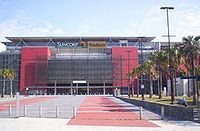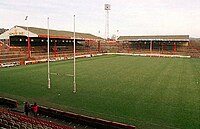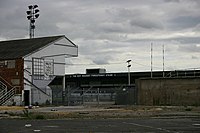1989–1992 Rugby League World Cup
| 1989–1992Rugby League World Cup | |
|---|---|
| Number of teams | 5 |
| Winner | |
| Matches played | 21 |
| Attendance | 300,059 (14,289 per match) |
| Points scored | 834 (39.71 per match) |
| Top scorer | |
| Top try scorer | |
1995> | |
The1989–1992 Rugby League World Cup(sometimes shortened to1992 Rugby League World Cup) was the tenth staging of theRugby League World Cup,and continued to use the three-year format, stretching across the years 1989 to 1992. As with the1985–1988 World Cup,teams played each other on a home-and-away basis. These matches were fitted into the normal international programme of three-match test series between the nations, with a pre-designated match from each series counting as the World Cup fixture. The tournament culminated in the1992 Rugby League World Cup final.
The matches went strictly to form, withAustraliaundefeated and certain to claim a world cup final berth as early as 1991.FranceandPapua New Guineawere uncompetitive, leading to a straight fight betweenNew ZealandandGreat Britainfor the right to meet the Kangaroos in the final. In the event the Lions were able to just edge out the Kiwis on points difference.
As they had done in1988,Australia had won the right to host the World Cup final. However, with the potential for a much larger attendance, theAustralian Rugby Leagueagreed to allow Great Britain to host the game at the 82,000 capacityWembley StadiuminLondon.The final was a surprisingly close affair, with Great Britain leading with only 12 minutes to go. The game's only try was then scored by centreSteve Renoufin his international debut for the Kangaroos and Australia were able to claim their fourth consecutive World Cup title before a world record international rugby league attendance of 73,631.[1]
Venues[edit]
| Lang Park | Elland Road | Mount Smart Stadium | Central Park |
| Capacity:32,500 | Capacity:32,500 | Capacity:30,000 | Capacity:30,000 |

|

|

|

|
| Lloyd Robson Oval | The Boulevard | Addington Showgrounds | Stade Gilbert Brutus |
| Capacity:17,000 | Capacity:16,000 | Capacity:15,000 | Capacity:13,000 |

|

|

| |
| Pioneer Oval | Danny Leahy Oval | Townsville Sports Reserve | Stade Albert Domec |
| Capacity:12,000 | Capacity:12,000 | Capacity:12,000 | Capacity:10,000 |

|
Final[edit]
The World Cup final was played atWembley StadiuminLondon.
| Wembley Stadium |
| Capacity:82,000 |

|
Matches[edit]
Group stage[edit]
| Team | Pld | W | D | L | PF | PA | PD | Pts | Qualification |
|---|---|---|---|---|---|---|---|---|---|
| 8 | 8 | 0 | 0 | 236 | 68 | +168 | 16 | Advances to theFinal | |
| 8 | 5 | 0 | 3 | 215 | 79 | +136 | 10 | ||
| 8 | 5 | 0 | 3 | 203 | 120 | +83 | 10 | ||
| 8 | 2 | 0 | 6 | 80 | 247 | −167 | 4 | ||
| 8 | 0 | 0 | 8 | 84 | 304 | −220 | 0 |
1989[edit]
The first match of the 1989–1992 World Cup was also the 3rd test of the1989 Trans-Tasman Test serieswhich was won 3–0 by Australia
1990[edit]
This match was also the 3rd and deciding test of the1990Ashes series.
1991[edit]
This match was also the 3rd and deciding test of the1991 Trans-Tasman series.
Australian wingerWillie Carnecrossed for a hat trick of tries in Port Moresby.
1992[edit]
3 July 1992
|
| Australia |
16–10 | |
|---|---|---|
| Tries: Daley Meninga Goals: Meninga (4) |
Tries: Offiah Goals: Eastwood(3) |
In addition to being an allocated World Cup match, this was the third, deciding test of the1992Ashes series.This six-point margin of defeat meant that New Zealand would need to beat Papua New Guinea by 109 points in the following match to prevent a Great Britain-Australia World Cup final in October.[2]
15 July 1992
|
| Australia |
36–14 | |
|---|---|---|
Townsville Sports Reserve,Queensland
Attendance: 12,470 |
Final[edit]
24 October 1992
2:30PM (BST) |
| Great Britain |
6–10 | |
|---|---|---|
| Tries: Goals: Deryck Fox(3/4) |
Tries: Steve Renouf Goals: Mal Meninga(3/4) |
Great Britain
|
Australia
|
|
| ||||||||||||||||||||||||||||||||||||||||||||||||||||||||||||||||||||||||||||||||||||||||||||||||||||||||||||||||||||||||||||||
This match set a new world record attendance for a rugby league international of 73,631, beating the previous record of 70,204 set at theSydney Cricket Groundduring the1932 Ashes series.[4]As they had done in1988,Australia won the right to host the World Cup final. However, in the interests of rugby league, and the potential for a much larger attendance since at the timeLang ParkinBrisbanecould only hold 33,000, and theSydney Football Stadiumcould only seat 42,000, theARLagreed to Great Britain hosting the final at the 82,000 capacity Wembley.
Unlike 1988 when Australia had agreed to let New Zealand host the Final atEden ParkinAucklanddue to dwindling international attendances in Australia, the international game had become popular again over the next four years (mainly due to much improved performances by Great Britain and New Zealand) and there was a good chance of sell-out crowd in either Brisbane orSydneyfor the game. However, the potential for an attendance at Wembley that would be almost or more than double the size that could be seen in Australia, and the potential exposure from playing the game at one of the world's most iconic stadiums, could not be ignored.
Both coaches picked experienced teams, with only Australian's Tim Brasher (fullback) and Steve Renouf (centre) making their international debut in the game. With incumbent fullbackAndrew Ettingshausenunavailable through injury, Australian coach Bob Fulton preferred utility outside back Brasher overNewcastle KnightsfullbackBrad Goddendue to Brasher's previous big game experience having played inBalmain's1989 Grand Finalloss as well as making hisState of Origindebutearlier in the year.Fulton also chose seven members from theBrisbane Broncos1992Winfield Cuppremiership winning team including exciting centre Renouf. Lions coach Mal Reilly chose to retain Garry Schofield as captain despite the presence of Ellery Hanley in the team. He also went with pace on the wings with Martin Offiah andSt. Helensflyer Alan Hunte.
The hard-fought final was a one-try affair, with Great Britain leading 6–4 with only 12 minutes remaining.[5]The onlytryof the match was then set up by Australian replacement back Kevin Walters, who, with a clever cut-out pass, put his Broncos teammate Steve Renouf into a gap not covered by replacement Lions centre John Devereux. Renouf, in his debut test for Australia, then raced 20 metres to score in the corner.[6]Otherwise, the two teams' kickers (Mal Meninga and Deryck Fox) were called upon to score most of the points, including Meninga's pressure sideline conversion of Renouf's try. The rain started pouring in the second half and Australia was able to hold Great Britain out and maintain their lead until the final siren.
Australia's triumph saw them win their fourth World Cup in a row after winning the previous cups in1975,1977and1988.It also ended a mini-hoodoo for the Kangaroos at London's Wembley Stadium. Australia had previously left the arena 21–12 losers in 1973, and the1990 Kangarooswere outplayed by Great Britain 19–12, but when it mattered most this time around Australia proved themselves as worthy World Cup champions.
The match was telecast live late at night throughout Australia on theNine Network,with commentary provided byRay Warren,Peter SterlingandPaul Vautin,with sideline comments fromChris Bombolas.The game broke Australia's midnight-to-dawn television ratings record which was set a year earlier by therugby union's1991 Rugby World Cup final.[7]
Try scorers[edit]
- 7
- 5
- 4
- 3
- 2
- 1
 Greg Alexander
Greg Alexander Gary Belcher
Gary Belcher Ben Elias
Ben Elias Brad Fittler
Brad Fittler Peter Jackson
Peter Jackson Chris Johns
Chris Johns Michael O'Connor
Michael O'Connor Steve Renouf
Steve Renouf Steve Roach
Steve Roach Mark Sargent
Mark Sargent Steve Walters
Steve Walters Christophe Auroy
Christophe Auroy Denis Biénès
Denis Biénès Christophe Bonnafous
Christophe Bonnafous Patrick Entat
Patrick Entat David Despin
David Despin Daniel Divet
Daniel Divet Gilles Dumas
Gilles Dumas David Fraisse
David Fraisse Daniel Verdès
Daniel Verdès Martin Dermott
Martin Dermott Paul Dixon
Paul Dixon Karl Fairbank
Karl Fairbank Deryck Fox
Deryck Fox Bobbie Goulding
Bobbie Goulding Les Holliday
Les Holliday Alan Hunte
Alan Hunte Paul Newlove
Paul Newlove Roy Powell
Roy Powell Anthony Sullivan
Anthony Sullivan Alan Tait
Alan Tait Dean Bell
Dean Bell Mark Elia
Mark Elia Gary Freeman
Gary Freeman Clayton Friend
Clayton Friend Gavin Hill
Gavin Hill Sean Hoppe
Sean Hoppe Kevin Iro
Kevin Iro Mike Kuiti
Mike Kuiti Dean Lonergan
Dean Lonergan Duane Mann
Duane Mann Jarrod McCracken
Jarrod McCracken Gary Mercer
Gary Mercer Tawera Nikau
Tawera Nikau Matthew Ridge
Matthew Ridge Brent Stuart
Brent Stuart Darrell Williams
Darrell Williams Sauna Babago
Sauna Babago Aquila Emil
Aquila Emil Paul Gela
Paul Gela Chris Itam
Chris Itam August Joseph
August Joseph James Naipo
James Naipo Gigmai Ongugo
Gigmai Ongugo Opoe Soga
Opoe Soga Goie Waine
Goie Waine
References[edit]
- ^Kdouh, Fatima (28 November 2013)."We take a look back at the greatest Rugby League World Cup finals of all time".The Daily Telegraph.
- ^Meninga breaks Britain's resistance(independent.co.uk)
- ^1992 Rugby League World Cup final
- ^Wilson, Andy (4 November 2011)."Wembley Rugby League internationals – in pictures".The Guardian.
- ^"1989 – 1992: AUSTRALIA".rlwc2013.com.Rugby League International Federation.Archived fromthe originalon 16 October 2013.Retrieved23 July2013.
- ^Roberts, Michael (2008).Great Australian Sporting Moments.Australia: The Miegunyah Press. p. 275.ISBN978-0-522-85547-0.
- ^Oliver, Robin (27 October 1992)."'Roos give 9 early-hours record ".The Sydney Morning Herald.p. 6.
